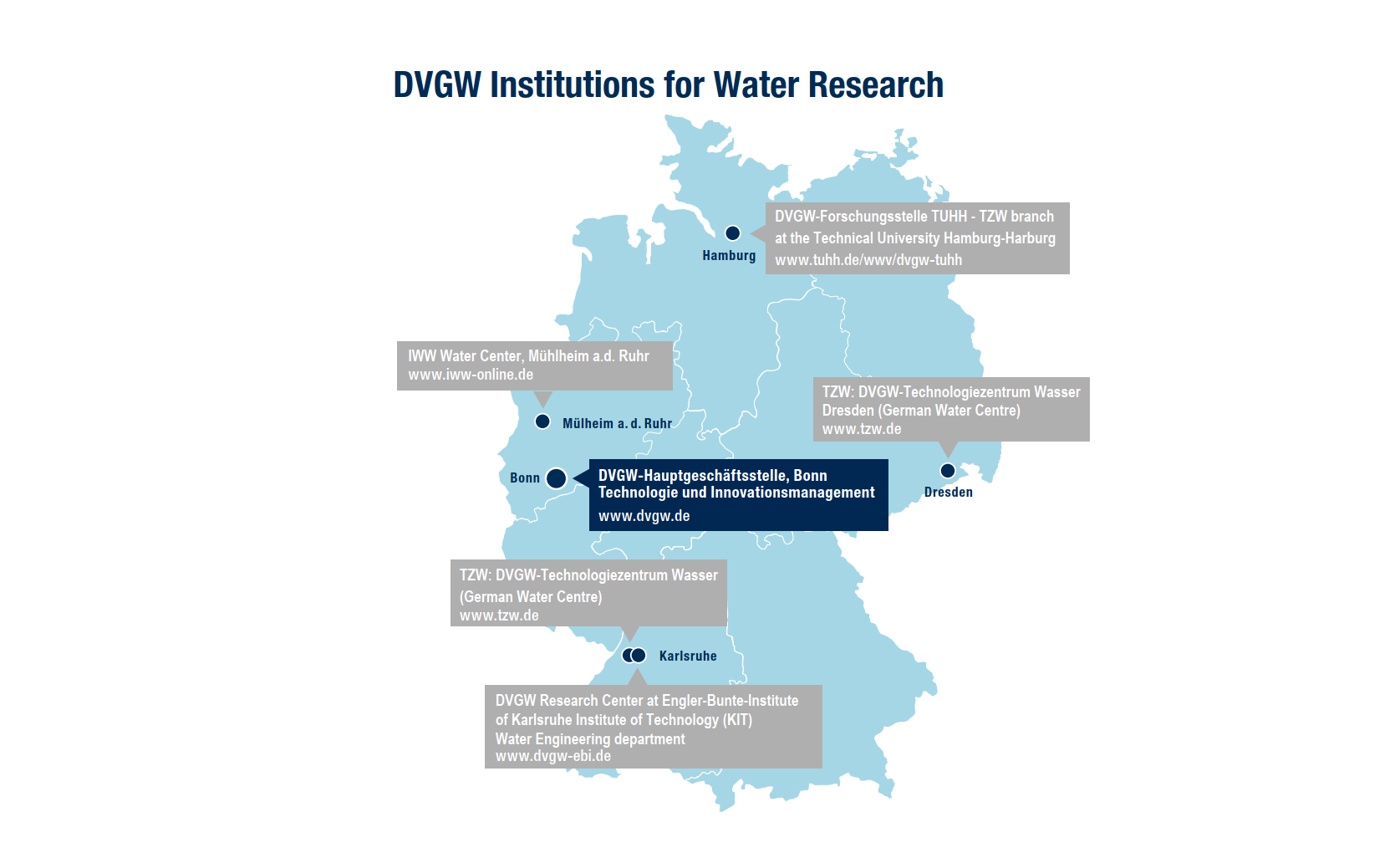
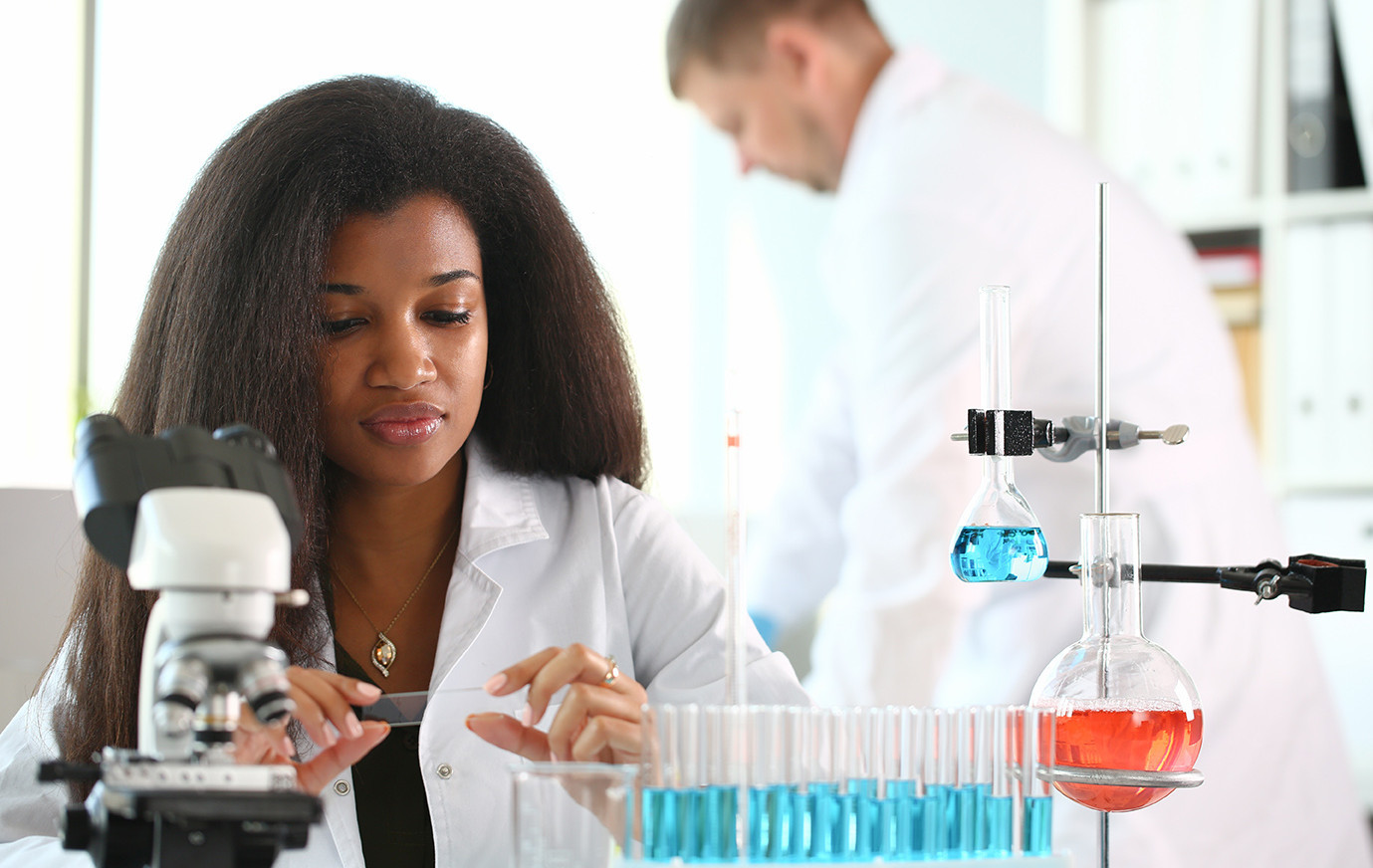
The aim of DVGW research is to prepare the gas and water supply in Germany for the future.
Research; © Adobestock.com/H-Ko
Pioneering solutions for the problems of our time
With research and innovation, DVGW has been supporting the energy sector on its way to climate neutrality for many years. The aim is to use the potential of climate-neutral gases for the energy transition and to maintain the value of gas infrastructures over the long term. In this way, the climate targets and the legal requirements for reducing greenhouse gas emissions by 2045 can be achieved. With its research and development activities, the DVGW also develops forward-looking approaches and innovative solution concepts for a secure and climate-resilient water supply - today and in the future!
With research and innovation, DVGW has been supporting the energy sector on its way to climate neutrality for many years. The aim is to use the potential of climate-neutral gases for the energy transition and to maintain the value of gas infrastructures over the long term. In this way, the climate targets and the legal requirements for reducing greenhouse gas emissions by 2045 can be achieved. With its research and development activities, the DVGW also develops forward-looking approaches and innovative solution concepts for a secure and climate-resilient water supply - today and in the future!


The DVGW runs several research and innovation funding programmes in both areas of interest, i.e. energy and water. Funding is supervised by several Research Advisory Boards for the respective research areas.
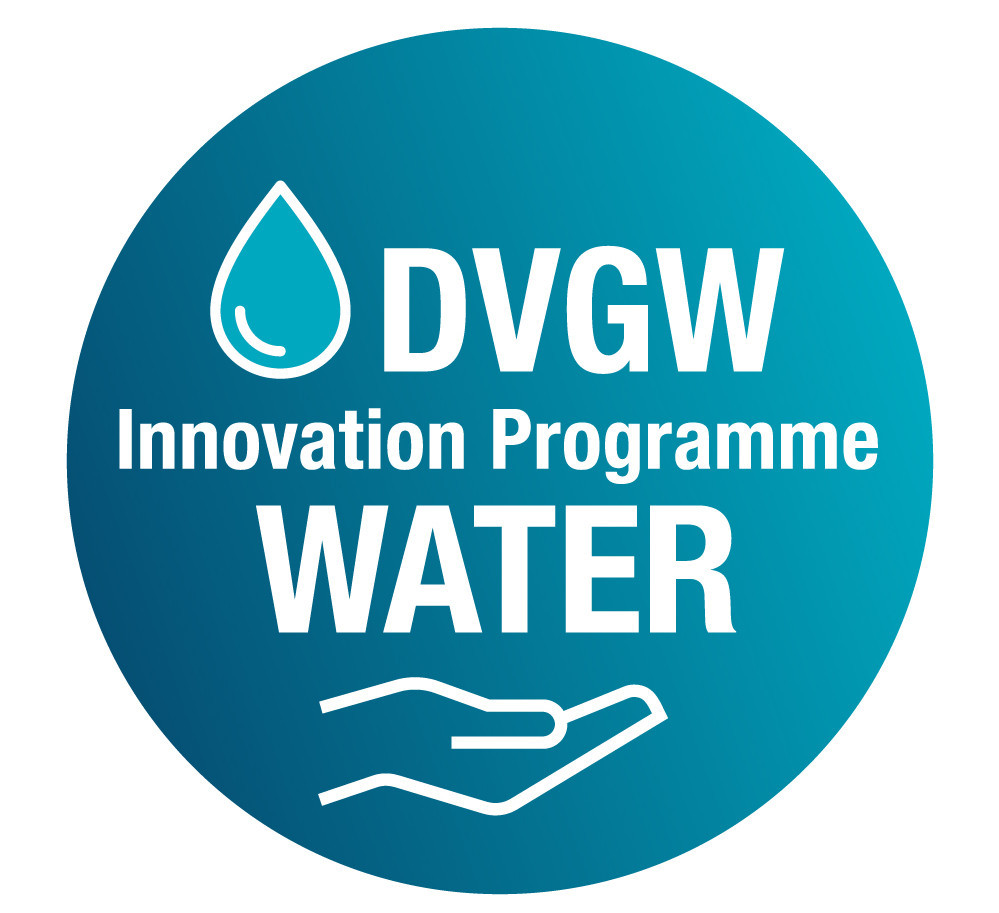
The DVGW Innovation Programme Water is intended to identify and close knowledge gaps, develop and test innovative concepts for the future and support their sustainable use by water suppliers. Research is carried out within the scope of studies and expert opinions, projects, technology development and testing and are incorporated into the rule-setting and the development of new DVGW services.
The DVGW Water Innovation Program addresses urgent priority issues for the future supply of drinking water in Germany with the following fields:
In order to ensure the high quality level and sustainability of German water supply in the long term, DVGW also devotes itself intensively to water research. The concepts cover the entire water cycle and focus on solutions that are technically and economically sustainable. Research covers three areas of the water supply: substances, systems and technologies.
The research work funded and coordinated by DVGW includes both regional projects and pan-European cooperation arrangements. DVGW’s research work is the basis for the technological development in the drinking water industry. It fosters rule-setting and standardization as well as technical recommendations. In addition, research ensures the scientifical quality for official statements of DVGW. These activities bear witness to the benefits of the interdisciplinary competence network.
The following management summaries on water issues are currently available in English:
All current DVGW research projects and final reports in German can be found on our German-language research webpage.

Hydrogen is key to an economical, environmentally friendly and safe supply of climate-neutral energy. In its role as a competence network for the gas industry, the DVGW has been promoting research in this area for more than ten years and is actively participating in numerous national and European projects. As part of the perennial Innovation Programme Hydrogen, the DVGW — as a standardization body for the gas and water industry, research initiator and educational institution — is now creating the basis for the future-proof and safe use of climate-neutral gases. With an extensive funding budget, the DVGW supports on a technical and scientific level the development of a hydrogen economy. By funding thematically appropriate projects, we will turn the vision into reality.
The determination to make things better is the driving force behind all the research and development activities of the DVGW. The objective is to transfer the results of research work to products and processes which maintain the leading international position of the German gas industry. Safety and environmental protection are the top priorities.
The research work funded and coordinated by DVGW includes both regional projects and pan-European cooperation arrangements. DVGW’s research work is the basis for the technological development in the gas and water industry. It fosters standardization and technical recommendations. In addition, research ensures the scientifical quality for official statements of DVGW. These activities bear witness to the benefits of the interdisciplinary competence network.
The following management summaries on water issues are currently available in English:
All current DVGW research projects and final reports in German can be found on our German-language research webpage.
The DVGW is involved in international research collaborations
Of the now more than 200 Water Europe members, six, including the DVGW, are based in Germany. The DVGW is represented on the Innovation and Technology Advisory Board (iTAB), which advises the decision-making bodies of Water Europe. The iTAB is primarily involved in the management of the existing 16 thematic working groups and in the initiation of new working groups.
In addition, the DVGW is actively involved in the working groups
In 2015, the DVGW head office and the DVGW-TZW Water Technology Center jointly launched the Water Europe “Water and Energy” working group. The working group, whose 24 founding members come from Austria, Finland, France, Germany, the Netherlands, Spain, Sweden and the United Kingdom. The Water Europe “Water and Energy” working group focuses on the integration of water and energy systems in order to develop sustainable solutions. Its tasks include promoting research and innovation in areas such as the water-energy nexus, energy efficiency in water management and the use of renewable energies for water treatment. The group works to identify and exploit synergies between the water and energy sectors to increase resource efficiency and minimize environmental impacts. Another focus is on developing technologies and strategies to reduce energy use in water infrastructure.
Hydrogen Europe Research is an international non-profit association consisting of over 150 universities and research and technology organisations from 29 countries. It promotes the development of hydrogen technologies and works to enable a sustainable and decarbonised energy future.
The DVGW has been a member of Hydrogen Europe Research since November 2016.
The DVGW is a founding and full member of the International Gas Union and represents the German gas industry. In recent decades, the DVGW has always supervised one of the eleven IGU committees.


Research & Development is really at the heart of ERIG. ERIG strives to develop new ideas, set up and apply for gas and energy research and innovation projects on European level. In support to this activity field, it is flanked by knowledge exchange and networking as well as communication and dissemination.
ERIG hosts a platform of national research institute and selected energy industry partners from the countries represented via the ERIG Country Members. ERIG promotes cooperation by organising and hosting internal conferences and managing an active online community.
Even the highest quality of research and scientific results are of no use unless the public is informed, and stakeholders gets access. ERIG promotes research results from its associated partners and especially from the projects where ERIG is acting partner. Via its extraordinary links to national stakeholders via its country members and seated in Brussels, ERIG is well equipped to manage this task in a most effective way. Prof. Dr Gerald Linke, the Chairman of the DVGW Executive Board, has also been President of ERIG since 2020.
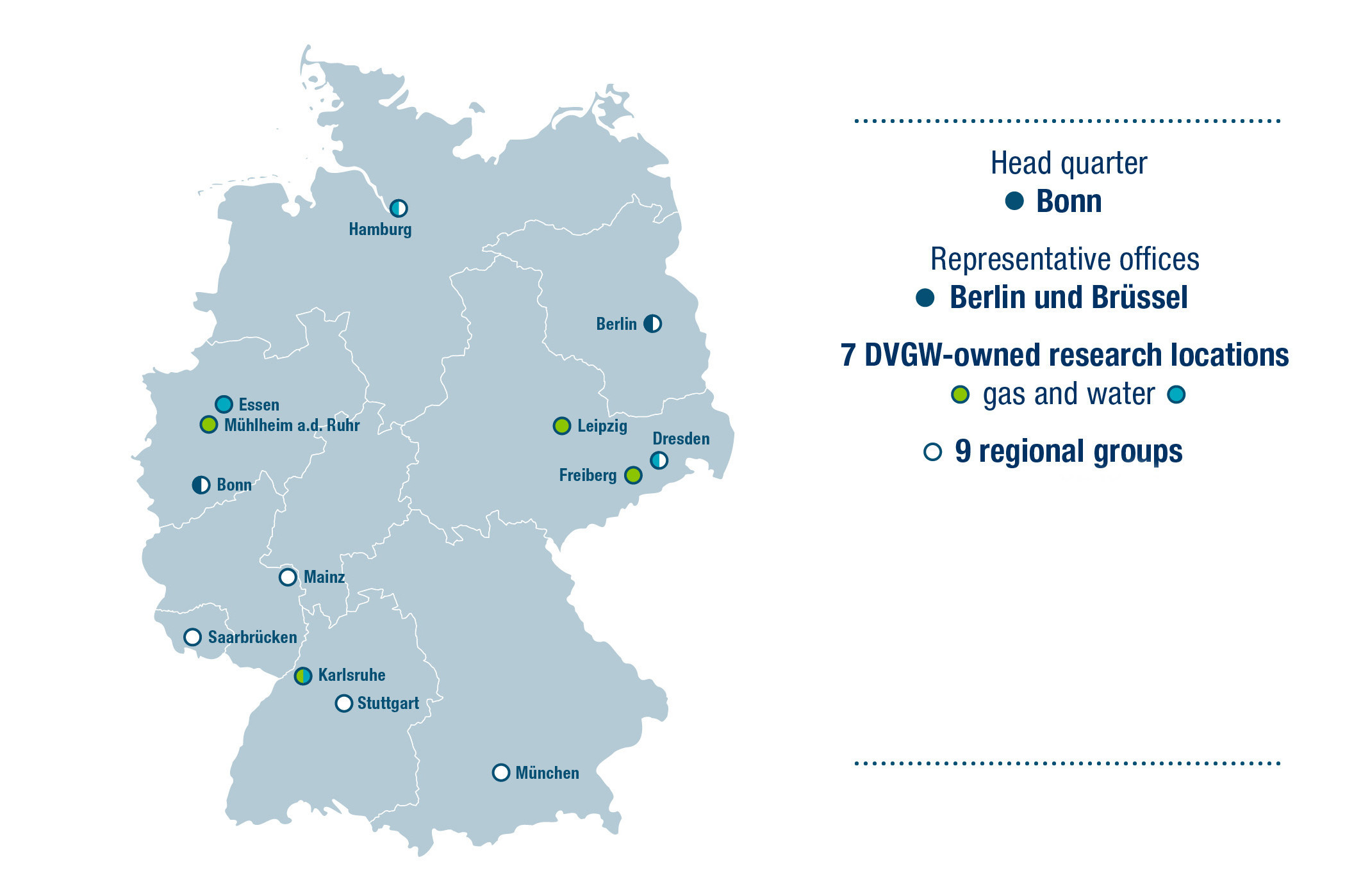
DVGW research is conducted at both the regional and national level and as part of Europe-wide collaborations. The DVGW research institutes combine scientific expertise and university partnerships with the practice of the gas and water industry. Their primary goals are safety, hygiene and environmental protection in the service of consumers and the development of forward-looking concepts for the energy transition.
Research is conducted at nine institutes in seven cities. The individual institutes complement each other in their expertise and form a comprehensive network covering all aspects of gas, energy and water. Depending on the task at hand, the institutes work on projects individually or in collaboration. They also work directly with external institutions – for example, on technical and scientific issues, expert reports or public research projects. This ensures that gas and water research and development is broadly based. The network concept extends beyond national borders. One example of this is the European Research Network for Gas and Energy Innovations (ERIG).
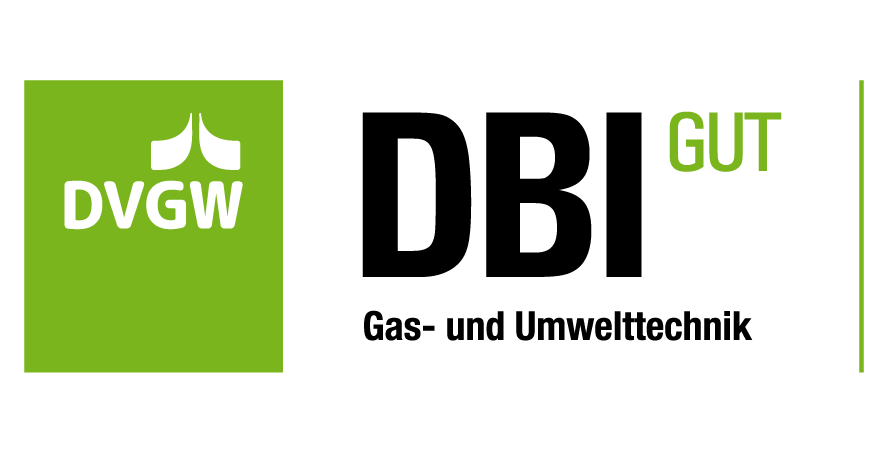
DBI Gas- und Umwelttechnik GmbH is based in Leipzig, a central location with a branch in Freiberg. In recent years, DBI has developed into a recognized national and international research center for the gas industry. It primarily works on economic and technical issues arising in practice. This takes place in the areas of gas production, gas transport and gas supply companies. Furthermore, it works with companies that use natural gas as an energy source. DBI GUT works and conducts research on current topics in the broad field of gas supply with over 80 employees. In close cooperation with the individual business units, fundamental research questions are investigated, for example in the fields of gas production and storage, thermoprocessing and gas process engineering, gas chemistry and gas treatment, as well as energy supply systems/renewable energies.
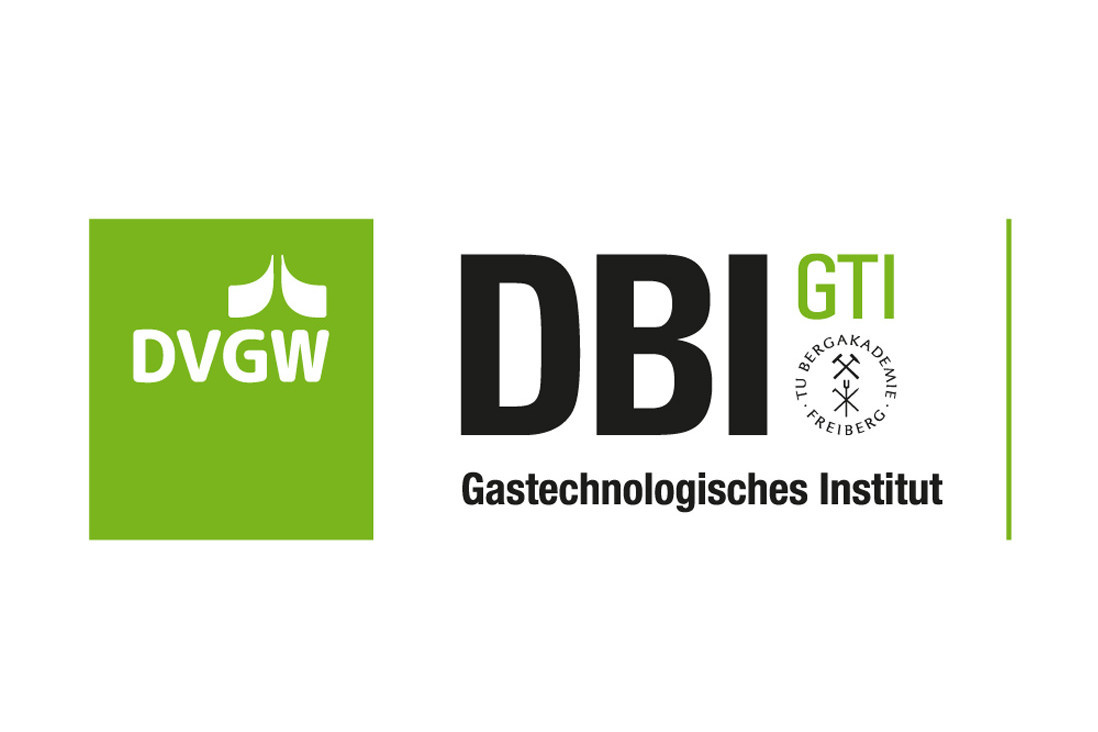
The increasing number of pre-competitive and basic research projects at DBI GUT GmbH has led to these areas being concentrated separately in a separate company. For this reason, the DBI Gastechnologisches Institut gGmbH (DBI-GTI) was founded in 1998 in Freiberg as a wholly-owned subsidiary of DBI GUT. It is an associated institute of the TU Bergakademie Freiberg. The DBI-GTI thus sees itself as a link between the DVGW and the university research landscape. In addition to research and development, the DBI-GTI is home to the independent DVGW testing laboratory for gas and energy technology, a gas chemistry laboratory and a training center for the DVGW's training and continuing education programs in the energy industry.
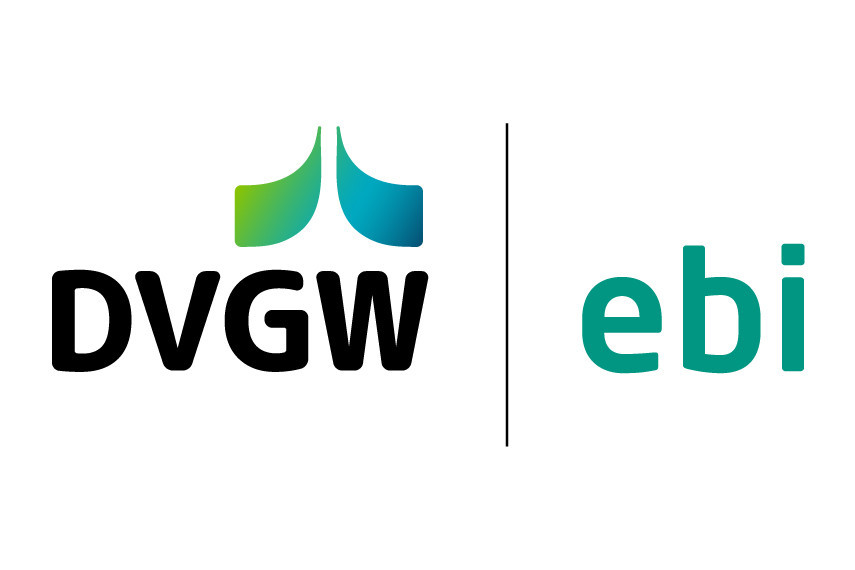
The DVGW Gas Research Center at the Engler-Bunte-Institute of the Karlsruhe Institute of Technology (KIT) is a joint, independent institution of the DVGW and the KIT. It is jointly supported by the EBI divisions “Chemical Energy Carriers - Fuel Technology” and “Combustion Technology” and is divided into the divisions of gas technology and the gas testing laboratory. The testing procedure in gas research has the following tasks: In the areas mentioned, tests are carried out, monitored and certified in conjunction with the DVGW – for example, gas appliances and fittings, electronic components, metallic and non-metallic materials and much more. The research center underlines the practical relevance of the chairs of the Engler-Bunte Institute; research is conducted that is relevant to practice. The staff advise companies in the gas industry, develop the principles of practical processes and are involved in many ways in national, European and international standardization work, which, in view of the common market, has increasingly shifted to the European or global level in recent years.
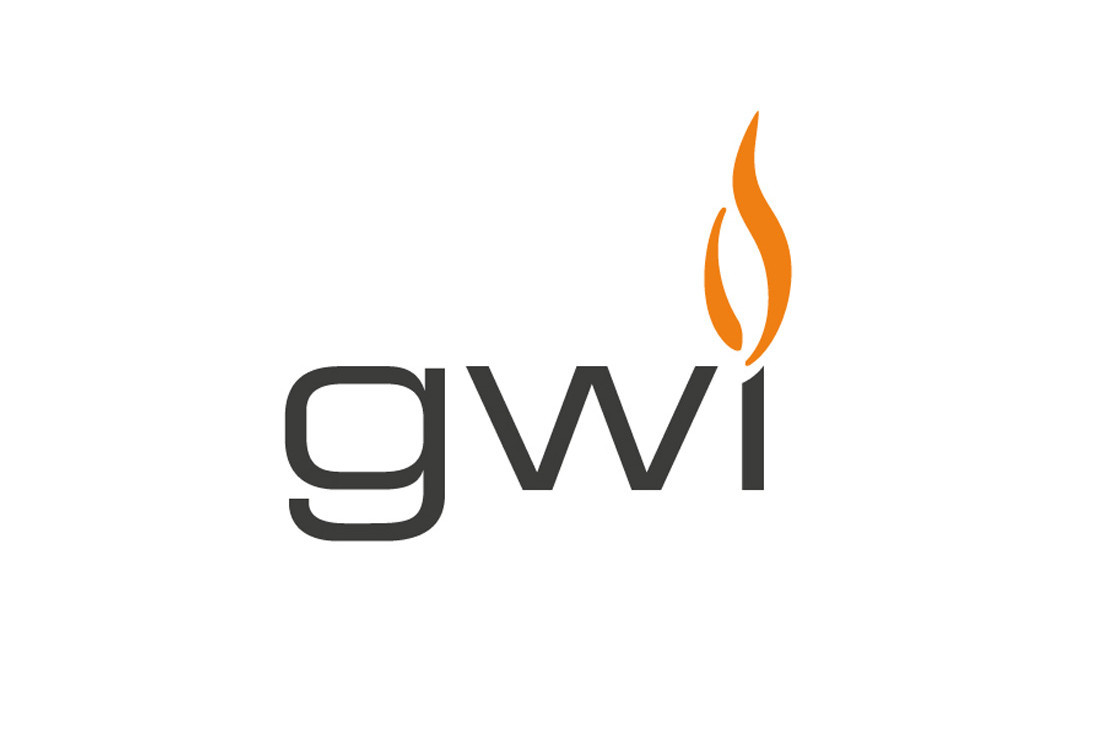
The activities of the Gas- und Wärme-Institut Essen e.V. (Gas and Heat Institute Essen) comprise three main areas: research and development, testing and further education. For many decades, the GWI has been shaping the energy topics of the future with its members, partners and customers. With the energy transition, the GWI has developed into a technology-open energy institute that is involved in numerous research projects at state, federal and EU level as well as in direct cooperation with industry as part of its application-oriented research and development work. Due to the close interlinking between the departments of research and development, training, testing laboratory and market conversion, the GWI has created far-reaching possibilities to support the transformation of the energy system from generation to transport to end use at various levels with its know-how.
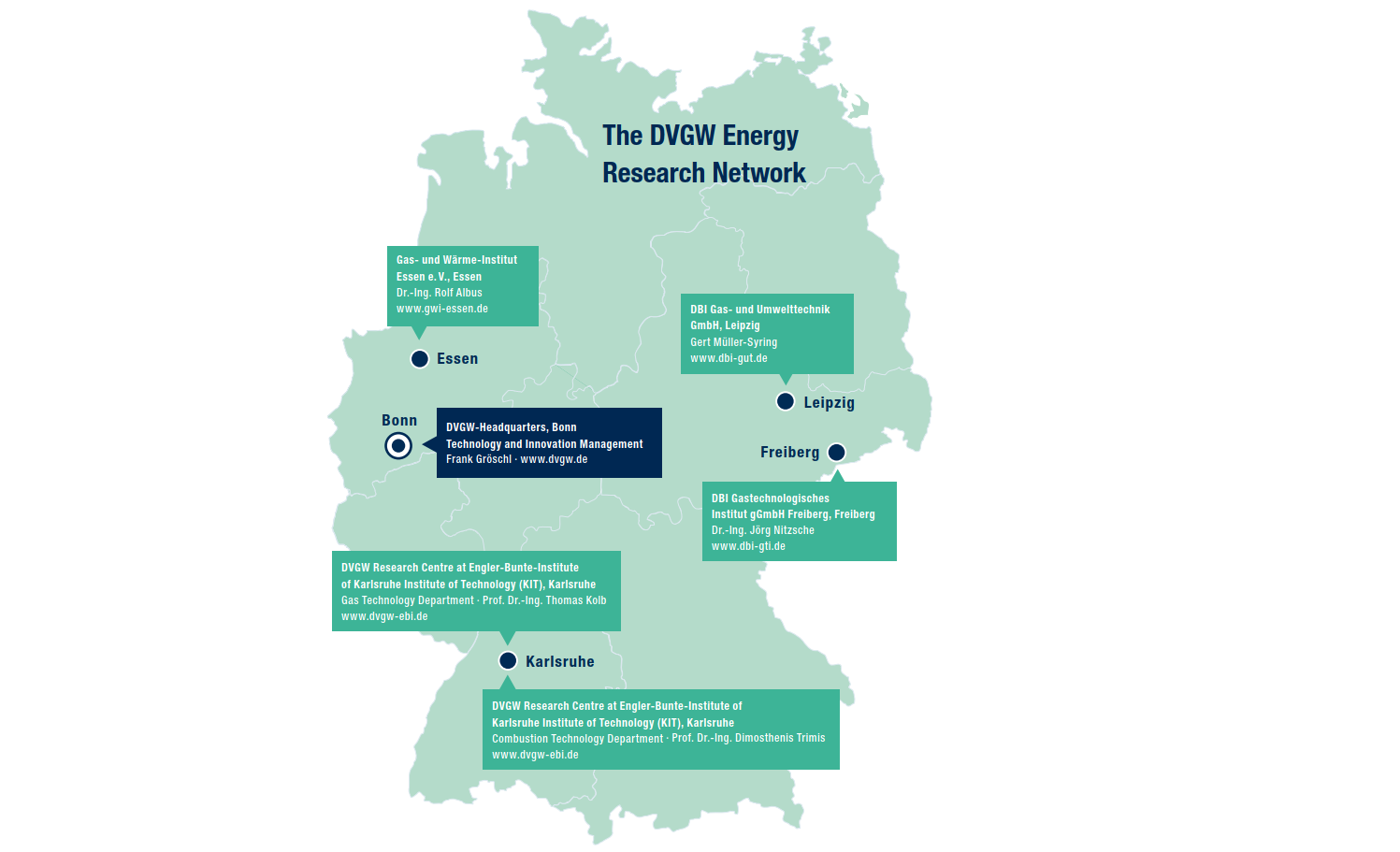

The DVGW Water Research Center at the Engler-Bunte-Institute of the Karlsruhe Institute of Technology (KIT) is a joint, independent institution of the DVGW and the KIT. It is jointly supported by the EBI division “Water Chemistry and Water Technology”. In the field of water chemistry and water technology, the work is oriented towards the current issues in water management with a research focus on water quality, water technology, biological wastewater treatment and biological interfaces. Water quality is of fundamental ecological importance and also determines the usability of water, especially for drinking water production. In addition to inorganic main ingredients, especially naturally occurring organic substances such as humic substances, anthropogenically caused organic trace substances (e.g. pharmaceuticals or pesticides), heavy metals as well as natural and synthetic nanoparticles play an important role in this context.
The main research topics are
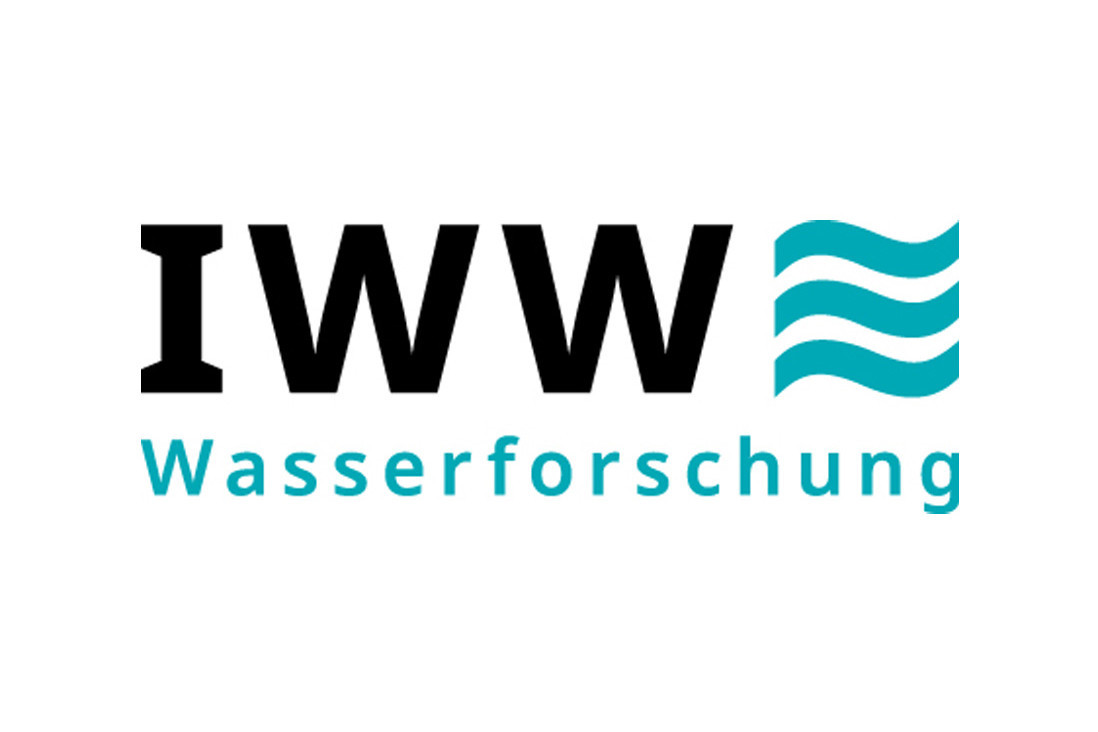
The IWW Institute for Water Research gGmbH is a centre for consulting, research and further education for all questions of water use in the areas of resource protection and water catchment, water technology, pipe networks, analytics, hygiene, economics and management. It is one of Germany's leading institutes for research, consultancy and training in water supply and is an affiliated institute of the University of Duisburg-Essen and a member of the Johannes-Rau-Forschungsgemeinschaft e. V. of the state of North Rhine-Westphalia. The services of the six business units – Water Resources Management, Water Technology, Water Networks, Water Quality, Applied Microbiology and Water Economics & Management – are used, for example, by utilities, industry, wastewater associations, public institutions and authorities. The IWW Water Centre consists of two companies: the IWW Wasserforschung gGmbH (Institute for Water Research) and the IWW Analytik und Service GmbH (IWW Analysis and Services).
To IWW website (in German only)
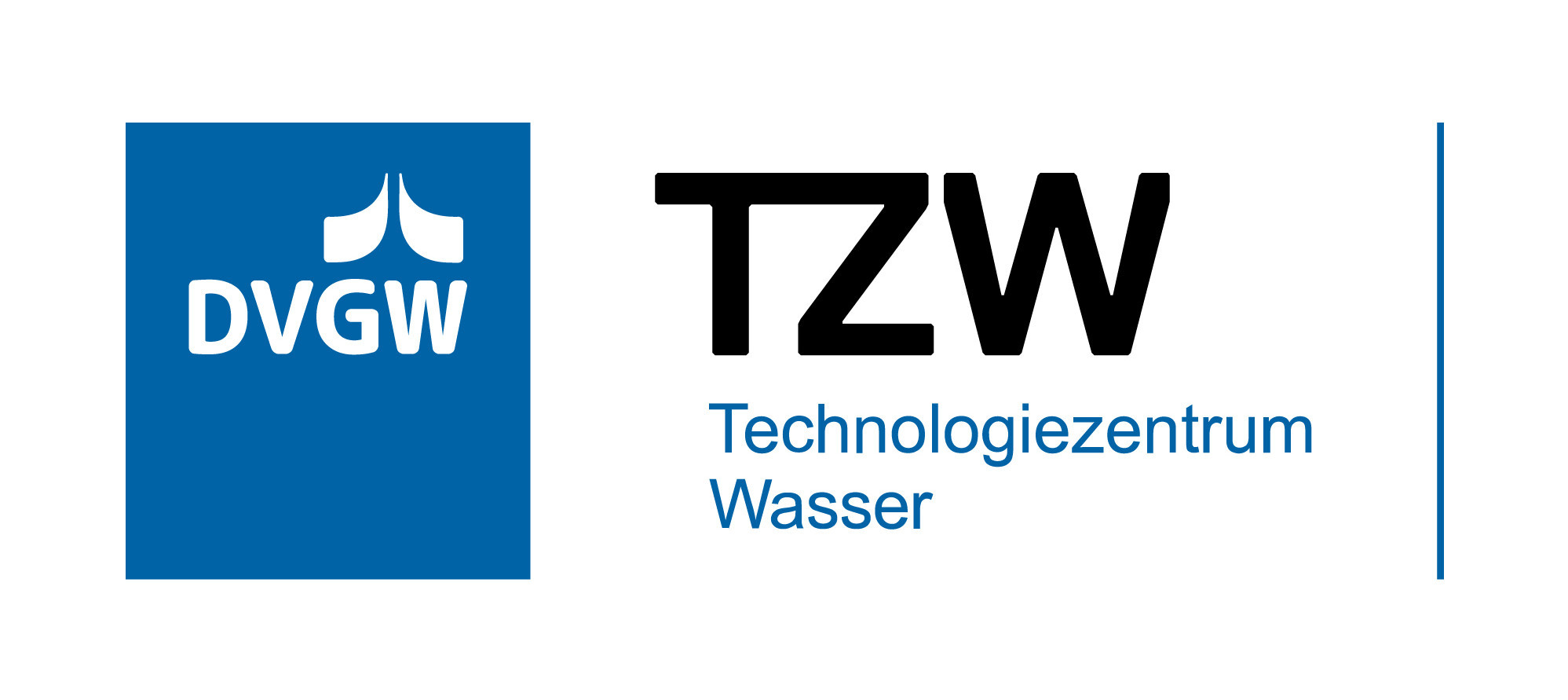
DVGW-Technologiezentrum Wasser (TZW - German Water Centre) has sites in Karlsruhe and Dresden. TZW emerged from the DVGW research centre at the Engler-Bunte Institute of the KIT campus (Karlsruhe Institute of Technology) of the University of Karlsruhe. Close cooperation with the university continues. Technologiezentrum Wasser (TZW), as a DVGW institution, is dedicated to technical and scientific issues related to water. Its core tasks are cooperation with water supply companies in the context of practical research and development work and the creation and implementation of the DVGW rules and regulations. In addition, the TZW is also the point of contact for authorities, ministries and associations on all matters relating to water quality, drinking water quality and water technology. It acts as a link between the DVGW, universities (basic research) and water supply companies.
The focus is on the topics of
TZW branch in Dresden was founded in 1991 with the aim of providing advice and dealing with specific issues of water supply companies in the new federal states. In addition to this task, which it continues to perform, the branch's work focuses on the field of distribution networks. Fundamental knowledge about the processes of quality change in water distribution systems has been gained through the work on and cooperation in national and international research projects in connection with the experience gained from the cooperation with water supply companies.
The DVGW Research Centre TUHH is linked to the Institute for Water Resources and Water Supply at the Hamburg University of Technology (TUHH). The professional cooperation and the shared use of analytical equipment and laboratories create synergies for both institutions. The combination of practical and scientific training is the basis for problem solving and technical innovation in the water industry. In addition to the cooperation with the two TZW research units, there are also close professional contacts with other important water research institutions in Germany, such as the DVGW research unit at the Engler-Bunte-Institute of the Karlsruhe Institute of Technology (KIT), the IWW Water Centre in Mülheim/Ruhr and the Innovation Centre Water of the TU Berlin. The DVGW works closely with the DVGW Regional Group North to support the water supply in northern Germany. In the area of consulting, the DVGW Research Center is a branch office of the Karlsruhe-based Water Technology Center (TZW).
